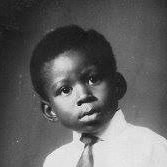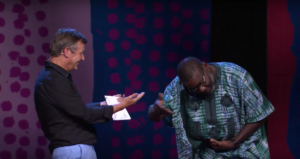I still get the occasional reference to this piece by total strangers who somehow still remember it 36 years on. As far as allegorical stories go, this is a classic about Nigeria, even if I say so myself. Three decades ago, the legacy of Britain’s perfidy and the spring-loaded self destruct ordinance it bequeathed to Nigeria at independence still haunts us till today. While arguably in today’s Nigerian compass, the needle having briefly oscillated at other cardinal points, still points generally due north, but not as unerringly as before. In the sixty years after independence, we have arrived at a point of great uncertainty and fragility with our various compasses, including our collective moral compass gone haywire. We have to reset our national compass to properly guide us in a new direction because the old compass has left us lost in Sambisa Forest. Enjoy.
Samuel A. Okoroshola was distraught. He had every reason to be. He had first heard the wispy rumours three weeks ago, but with each passing day, the story had become embodied; now it was almost official. And as he sat in the ‘owner’s corner’ of his official vehicle, homeward bound, and with the car’s air-conditioner ‘blasting’ away, he found that, in spite of the cabin’s clemency, he was sweating.
Self-delusively, he attributed his discomfiture to the maddening snarl of traffic that was the daily exodus from the Lagos Island to the Mainland in the late afternoon. But most privately, he knew that after almost ten years of plying the same route home, the ‘go-slow’ was the least of his problems.
Alao, his driver for the past seven years sensed that his oga was terribly upset; through his rear-view mirror, he could see that his master was now sweating quite profusely…instinctively he reached out and turned the air-conditioner full blast.
He wondered (almost aloud) what had shaken his master so visibly; perhaps it was not unconnected with the rumours he had heard two weeks ago concerning his oga. Yes! That was it. He shook his head sadly and muttered quite audibly in disgust, “Ha! This kine country sef ”.
Samuel A. Okoroshola was still wrapped in his thoughts and oblivious to the world around him, when the metallic grey Peugeot 505 pulled into the drive-way of the huge house nestling deep in the GRA (Government Reserve Area).
“Oga we don reach o”, Alao reminded him almost perfunctorily, as he got out to open his master’s door, and to take Samuel’s big black Samsonite briefcase. Mrs. Gertrude Okoroshola was at the doorway waiting (as she had done for the past twenty-six years of blissful matrimony) to receive her husband.
As he alighted, she instinctively knew that something was wrong; she also
knew that after dinner was the best time to inquire. After freshening up and changing into his house clothes, it suddenly occurred to Samuel that he hadn’t seen his last child, the only one out of four at home these days, and certainly, the apple of his eye.
“Roody dear”, he half-shouted from the living room to his wife who as usual was busy in the kitchen, “where is Junior?” “Junior? I think he is upstairs in his room reading or something”.
Samuel A. Okoroshola Jr., crouched intently over a shiny circular object that lay on the carpet, did not hear his father enter. Samuel Sr. was certainly proud of his precocious nine-year old. To him, Junior embodied that quintessential aspect of him that many respected – his brilliance. Anytime he saw Junior, something from deep inside of him smiled, rising up to attack those deep furrows of anxiety etched almost indelibly on his rugged handsome features.
‘Hi, Son,” he said, with a sunshine smile radiating from his face. Junior, momentarily startled, took a flying leap off the carpet, almost bowling his father over in an unabashed hug of deep affection – father and son were very close.
“How was school today?” Sam inquired. “Fine daddy, fine – how was work?” This was a traditional exchange of greeting, although Sam felt tempted to break tradition by replying truthfully -“terrible”. He obliged his son by replying in mock falsetto, “Fine Sonny, fine.”
“What’s that on the floor”, Sam asked his son. “What…oh, that’s my compass; the geography teacher gave it to me as a prize for coming first during last term’s exams,” and with that, Junior slid down his father, picked up the compass, and offered it almost as a presentation.
As Sam settled down to sit on the edge of Junior’s bed, he knew that he would be inundated with questions – Junior had a prodigious appetite for knowledge.
“Daddy what are the cardinal points? Is a cardinal of a church a point too?” Sam, laughing half aloud, replied, “No, a cardinal is not necessarily a point. The cardinal points are the four different points marked out on the compass – see, clockwise, it goes North, East, South, West”.
“Daddy, what about all these other marks?” “Those ones stand for North-East, South-East, South-West, and North- West.” “Daddy which direction is north?” “North is where that needle is pointing to”. “I know, but suppose you were outside without the compass, would you know where North is?”
Sammy, remembering his scouting days, replied, “Sure —North is always to your left when you are facing the sunrise.” Junior, pausing for a moment to launch another fusillade, suddenly took the compass from his father, and gave it a vigorous shake. The needle spun round wildly and faithfully settled down, pointing north. “Daddy, why does the needle always point north?”
Sammy was about to explain that the magnetised needle necessarily points in the direction of the North Pole, because of the natural flow of electromagnetism that flows from that Pole, when all of a sudden he remembered work, the office, the intrigues, and his depression.
Before he went to university in 1956, he joined the Ministry of National Organisation and Development as an assistant clerical officer, in 1954. After university, and with a Bachelors’ degree in Classics tucked under his belt, he re- entered the Ministry in 1960, as an administrative officer. Since then, through sheer grit and hard work, he rose through the ranks to where he presently is – Deputy Permanent Secretary.
He had, because of his unusual honesty and integrity, survived all the probes, including the one that recently dislodged his boss, the Permanent Secretary. Now, at the age of fifty, and after 24 solid years of hard work and personal sacrifices for the fatherland, he quite naturally expected to be made Permanent Secretary.
But the rumours have reached him that the new Permanent Secretary will be a young man of twenty seven (the same age as his first daughter) who finished his Youth Service two years ago. He was still wrapped in his introspection when the persistence of Junior finally broke through, “Daddy, why does the needle point north?”
Samuel A. Okoroshola absentmindedly replied, “Yes…In Nigeria, the needle always points North.” Samuel A. Okoroshola Jr. shook his head quizzically at nobody in particular, at his father’s reply.
The Punch,
Saturday, June 9, 1984



